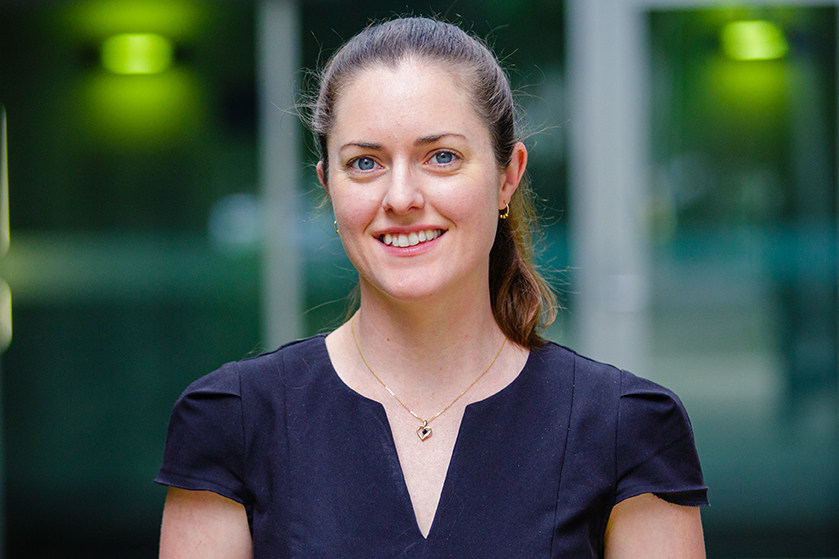Each month we shine the spotlight on a researcher within the Faculty of Health and Behavioural Sciences.

This month we caught up with Dr Shelley Keating, NHMRC Emerging Leadership Fellow within the UQ School of Human Movement and Nutrition Sciences.
What are your key research interests?
My research focusses on understanding and influencing the role of exercise in the prevention and management of obesity-related cardiometabolic disease.
My three key research themes are:
- efficacy (what types and amounts of exercise are best)
- measurement (how can we accurately and reliably measure the ‘dangerous’ fat located in and around the abdominal organs)
- translation (how can we get people adopting and adhering to optimal levels of self-directed exercise in the long term).
Can you share some of your career highlights so far?
In 2017 I was awarded an NHMRC Early Career Fellowship to further my work in developing personalised exercise strategies for the obesity-related condition known as metabolic-associated fatty liver disease. This work has led to a collaboration with the Metabolic Obesity Research Group (MOBY) based at the Princess Alexandra Hospital, which has enhanced the breadth and depth of my work. This collaboration has enabled both multidisciplinary and interdisciplinary research ventures. I thoroughly enjoy working with the team of passionate, intelligent and forward-thinking clinicians and researchers.
A recent highlight (October, 2020) was receiving the prestigious Australia and New Zealand Obesity Society (ANZOS) Young Investigator Award, recognising the originality and impact of my work in exercise for obesity management. I was thrilled to be able to highlight the significant and beneficial role of exercise in obesity management to my peers in both academic and clinical roles.
What aspects do you enjoy most about your work?
The best part of my work is the people I work with - my colleagues, my research participants and my students, from whom I learn on a daily basis. I love the stimulating science-chats and idea exchanges that occur in formal meetings and ‘think tank’ sessions, as well as ‘corridor chats’. Given the multidisciplinary nature of the School of Human Movement and Nutrition Sciences I’m able to learn about and observe many different research methods across different professional settings.
I also love learning about the personal side of the individual journey from those who participate in our research. It helps keep me driven and focussed to answer patient-important research questions and translate our clinical research findings into the community.
What inspired you to pursue a career in academia?
After graduating as an Accredited Exercise Physiologist, I worked in clinical practice for a few years. I was working predominantly in weight management and with people with type 2 diabetes and went back to undertake a Masters in Clinical Exercise Science to deepen my knowledge in this area. During my Masters I realised that there were many unanswered questions about the role of exercise, and specifically the ‘dose’ of exercise that would most benefit the people I worked with - so I undertook a PhD to explore this. I loved the research process as well as the teaching opportunities I had (aided by an amazing PhD supervisor Associate Professor Nathan Johnson) and pursued academia thereafter.
What advice would you give to someone thinking about a research career?
The best advice I received was to never collaborate/work with someone you wouldn’t be happy to have a beer [or other beverage of preference] with. The support and mentorship networks, communication channels and people that surround you make all the difference for navigating the challenges, celebrating the successes, and keeping the focus required for a long and fruitful research career. It is easy to be overwhelmed in academia and to feel like you are not doing ‘enough’. I found this especially when returning in a part-time capacity after maternity leave. I have since worked with my support networks and focussed on having a strong strategic plan that enables me to prioritise work that aligns with my career goals. Having a clearly defined strategic plan allows me to feel ‘on track’ and to re-calibrate plans when the unexpected occurs (e.g. global pandemic).
What are your interests outside of work?
I love hiking and nature, so try to get out when possible. I am also mum to an active 2-year-old son so most of my time outside of work is family time and finding new and varied ways to burn off toddler energy.
What do you enjoy most about living in Brisbane?
I’m from Sydney, so I love the size of Brisbane and how easy it is to get around (I used to commute 90 minutes on public transport each way each day, and now enjoy a 20 minute walk to work). The cycle ways are great, and I love the UQ campus - particularly at this jacaranda-filled time of year.
Currently recruiting
Current research for which Dr Keating is seeking volunteers includes:



